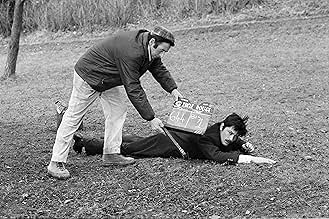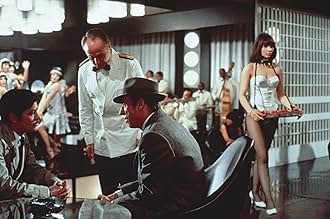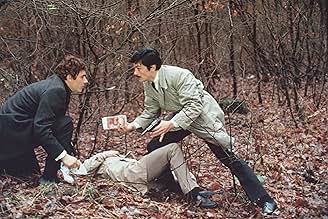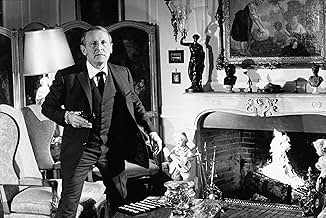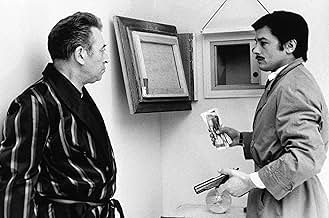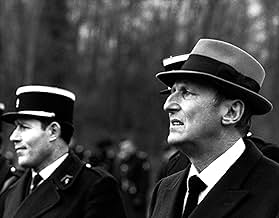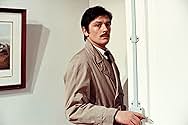PUNTUACIÓN EN IMDb
7,9/10
30 mil
TU PUNTUACIÓN
Tras salir de la cárcel, el experto ladrón Corey se cruza en el camino con un conocido prófugo y un antiguo policía alcohólico. Los tres trazarán el plan de un elaborado golpe.Tras salir de la cárcel, el experto ladrón Corey se cruza en el camino con un conocido prófugo y un antiguo policía alcohólico. Los tres trazarán el plan de un elaborado golpe.Tras salir de la cárcel, el experto ladrón Corey se cruza en el camino con un conocido prófugo y un antiguo policía alcohólico. Los tres trazarán el plan de un elaborado golpe.
Bourvil
- Le Commissaire Francois Mattei
- (as André Bourvil)
Gian Maria Volontè
- Vogel
- (as Gian-Maria Volonte)
François Périer
- Santi
- (as François Perier)
Anna Douking
- L'ancienne amie de Corey
- (as Ana Douking)
Alain Delon's Top 10 Films, Ranked
Alain Delon's Top 10 Films, Ranked
To celebrate the life and career of Alain Delon, the actor often credited with starring in some of the greatest European films of the 1960s and '70s, we rounded up his top 10 movies, ranked by IMDb fan ratings.
Argumento
¿Sabías que...?
- CuriosidadesThe heist sequence lasts for exactly 27 minutes and features no dialogue at all.
- PifiasCorey's Plymouth has Marseille 13 plates in the showroom and halfway through the film. In Paris, the plates suddenly change to Paris 75 plates and after this, back to Marseille 13 plates.
- Citas
Le chef de la police: All men are guilty. They're born innocent, but it doesn't last.
- Créditos adicionalesThe movie's Opening Credits include an epigraph: "Siddhartha Gautama, the Buddha, drew a circle with a piece of red chalk and said: 'When men, even unknowingly, are to meet one day, whatever may befall each, whatever the diverging paths, on the said day, they will inevitably come together in the red circle.'" This quote explains the title of the film.
- Versiones alternativasAn alternate, 83-minute English-language version also exists, wherein most of the lead performers delivered their lines in (generally phonetic) English. This version was released to Korean home video under the title "Circle It In Red", although the actual onscreen title of the print reads "The Red Circle".
- ConexionesFeatured in Sous le nom de Melville (2008)
Reseña destacada
THE RED CIRCLE (Jean-Pierre Melville - France/Italy 1970).
This might be the coolest film ever made, in the most literal sense of the term. The men here never lose control and never - not once - show their emotions. No dramatic outbursts in this film. Everyone is cool all the time. It's an abstract dream-world, where the men live by their own code, a gangster code with the values of the outside world conspicuously absent. In this masterfully filmed heist saga, Melville tackles the American crime thriller in his distinctly dark and desolate style, yet made in grand fashion with a hefty budget of ten million dollars and with four of the greatest French stars at the time. Alain Delon as the master thief, Yves Montand as an alcoholic ex-cop, Italian star Gian-Maria Volonté as an escaped criminal and André Bourvil in an atypical role as the cynical police chief.
Melville described LE CERCLE ROUGE as his penultimate film and it is indeed a masterfully stylized policier. He also claimed he wanted to shoot a film noir in colour and in many ways he succeeded. The two primary influences for this film were John Huston's 1950 heist movie THE ASPHALT JUNGLE and Jules Dassin's RIFIFI (1955). But unlike these films, where we learn much about the background of the individual gang members, with all their petty needs and worries that motivate them, making clear these are not just ruthless underworld types, but ordinary individuals engaged in a world of everyday worries and human endeavour, Melville, though, tells us almost nothing about his criminals. Why was Corey (Alain Delon) in jail? Why was his associate, Vogel (Jean-Marie Volonté) arrested in the first place? Or why the ex-police marksman Jansen (Yves Montand) left the force, was it his alcoholism? We never learn the motivations behind their actions and never find out what drives these men. Women are even more absent than in his earlier films, with the "emotional" ties exclusively between men. They don't even seem to have personal lives. A sort of an emotional twilight zone and although the setting is not as abstract as in his earlier LE SAMOURAI (1967), Melville still sketches a very eerie world. Melville's favorite actor, Alain Delon, is perfect and almost outdoes himself in coolness, if imaginable.
Deliberately paced and with a length of over 140 minutes, Melville takes his time to tell the story, but its slow pace and length seems a perfect way to show the desolate world these men live in. Nothing is ever out of place in Melville's films and here it's no different, every little detail seemingly of pivotal importance for the story. Although LE SAMOURAI remains my favorite Melville film, even up there with the greatest films ever made, this one also belongs to the very best.
Camera Obscura --- 10/10
This might be the coolest film ever made, in the most literal sense of the term. The men here never lose control and never - not once - show their emotions. No dramatic outbursts in this film. Everyone is cool all the time. It's an abstract dream-world, where the men live by their own code, a gangster code with the values of the outside world conspicuously absent. In this masterfully filmed heist saga, Melville tackles the American crime thriller in his distinctly dark and desolate style, yet made in grand fashion with a hefty budget of ten million dollars and with four of the greatest French stars at the time. Alain Delon as the master thief, Yves Montand as an alcoholic ex-cop, Italian star Gian-Maria Volonté as an escaped criminal and André Bourvil in an atypical role as the cynical police chief.
Melville described LE CERCLE ROUGE as his penultimate film and it is indeed a masterfully stylized policier. He also claimed he wanted to shoot a film noir in colour and in many ways he succeeded. The two primary influences for this film were John Huston's 1950 heist movie THE ASPHALT JUNGLE and Jules Dassin's RIFIFI (1955). But unlike these films, where we learn much about the background of the individual gang members, with all their petty needs and worries that motivate them, making clear these are not just ruthless underworld types, but ordinary individuals engaged in a world of everyday worries and human endeavour, Melville, though, tells us almost nothing about his criminals. Why was Corey (Alain Delon) in jail? Why was his associate, Vogel (Jean-Marie Volonté) arrested in the first place? Or why the ex-police marksman Jansen (Yves Montand) left the force, was it his alcoholism? We never learn the motivations behind their actions and never find out what drives these men. Women are even more absent than in his earlier films, with the "emotional" ties exclusively between men. They don't even seem to have personal lives. A sort of an emotional twilight zone and although the setting is not as abstract as in his earlier LE SAMOURAI (1967), Melville still sketches a very eerie world. Melville's favorite actor, Alain Delon, is perfect and almost outdoes himself in coolness, if imaginable.
Deliberately paced and with a length of over 140 minutes, Melville takes his time to tell the story, but its slow pace and length seems a perfect way to show the desolate world these men live in. Nothing is ever out of place in Melville's films and here it's no different, every little detail seemingly of pivotal importance for the story. Although LE SAMOURAI remains my favorite Melville film, even up there with the greatest films ever made, this one also belongs to the very best.
Camera Obscura --- 10/10
- Camera-Obscura
- 6 dic 2006
- Enlace permanente
Selecciones populares
Inicia sesión para calificar y añadir a tu lista para recibir recomendaciones personalizadas
- How long is Le cercle rouge?Con tecnología de Alexa
Detalles
- Fecha de lanzamiento
- Países de origen
- Idioma
- Títulos en diferentes países
- Le Cercle Rouge
- Localizaciones del rodaje
- Place du Panthéon, Paris 5, París, Francia(arrest of Santi's son)
- Empresas productoras
- Ver más compañías en los créditos en IMDbPro
Taquilla
- Recaudación en Estados Unidos y Canadá
- 432.820 US$
- Fin de semana de estreno en EE. UU. y Canadá
- 14.843 US$
- 12 ene 2003
- Recaudación en todo el mundo
- 473.897 US$
Contribuir a esta página
Sugerir un cambio o añadir el contenido que falta

Principal laguna de datos
By what name was Círculo rojo (1970) officially released in India in English?
Responde
![Ver Bande-annonce [OV]](https://m.media-amazon.com/images/M/MV5BMjJmZTZkZjctODI5My00ZmI3LWE4ZjYtMTUxMjQ0NmUzMTZmXkEyXkFqcGdeQXRyYW5zY29kZS13b3JrZmxvdw@@._V1_QL75_UX500_CR0)

